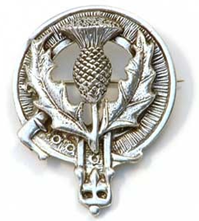|
Barrosa
refers to the Battle of Barrosa (Chiclana, 5 March 1811). The
battle was part of an unsuccessful maneuver to break the
siege of Cádiz in Spain during the Peninsular War. During the
battle, a single British division defeated two French divisions
and captured a regimental eagle. The
first French eagle was captured from the French in this battle,
the 8th of the line losing its eagle to Ensign Keogh of the 87th
Irish Foot (Royal Irish Fusiliers); he was killed immediately
afterward, but Sergeant Masterson, grabbed the eagle and was
later given a battlefield commission to Lieutenant for this
feat.
Masterson’s
regiment, the 87th Foot, was known in the Peninsular for their
battle cry “Faugh a Ballagh”, the Irish for “Clear the way”.
Following Barossa the regiment was “recommended to the Prince
Regent” who awarded them the title of “Prince of Wales’ Own
Irish Regiment” and directed that they wear an eagle on their
colors and appointments.
Cádiz had been
invested by the French in early 1810, leaving it accessible from
the sea, but in March of the following year a reduction in the
besieging army gave its garrison of Anglo-Spanish troops the
opportunity to lift the siege. A large Allied strike force was
shipped south from Cádiz to Tarifa, and moved to engage the
siege lines from the rear. The French, under the command of
Marshal Victor, were aware of the Allied movement and redeployed
to prepare a trap. Victor placed one division on the road to
Cádiz, blocking the Allied line of march, while his two
remaining divisions fell on the single Anglo-Portuguese
rearguard division under the command of Sir Thomas Graham.
Following a fierce
battle on two fronts, the British succeeded in routing the
attacking French forces. A lack of support from the larger
Spanish contingent prevented an absolute victory, and the French
were able to regroup and reoccupy their siege lines. Graham's
tactical victory proved to have little strategic effect on the
continuing war, to the extent that Victor was able to claim the
battle as a French victory since the siege remained in force
until finally being lifted on 24 August 1812.
|



